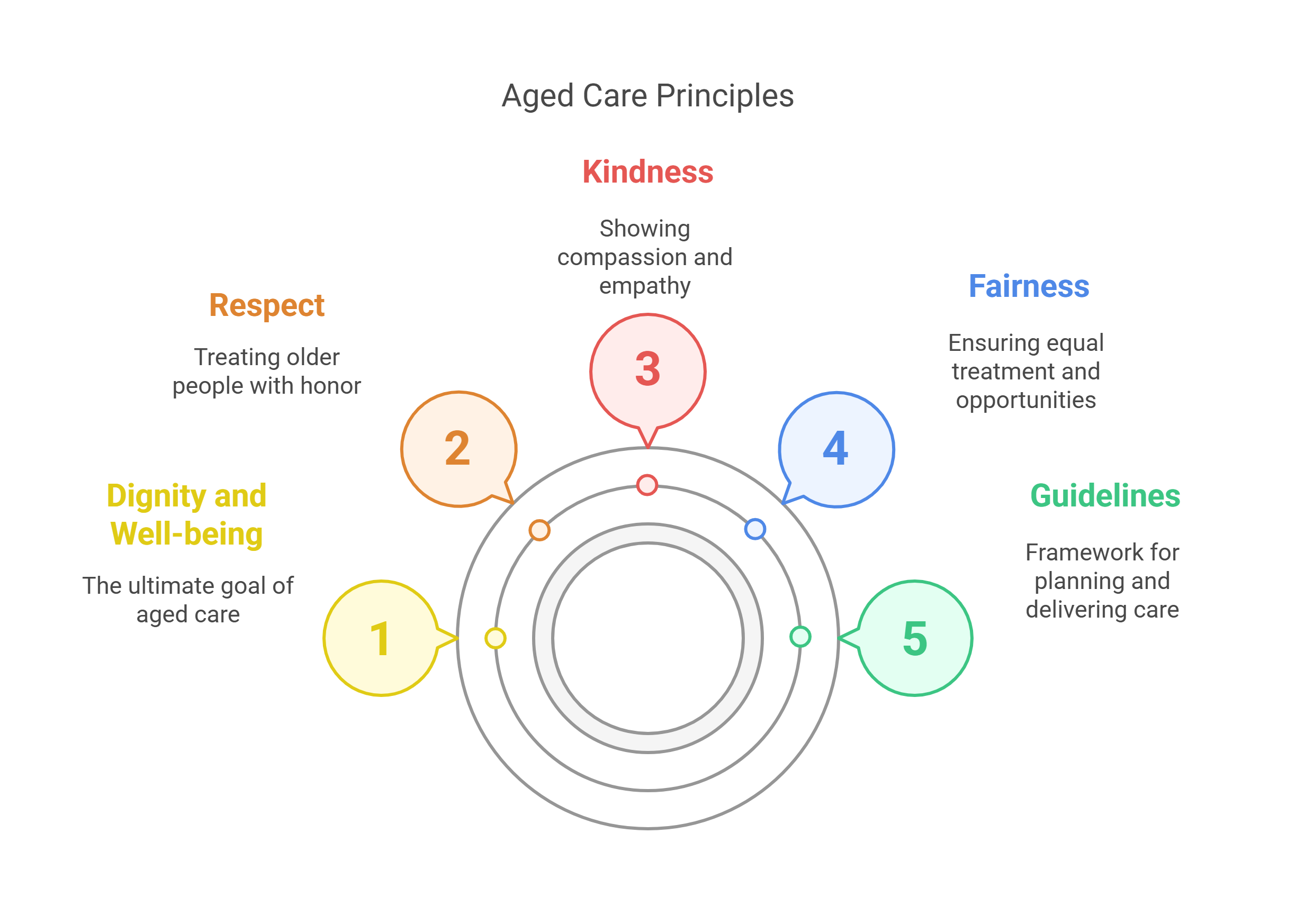What are Aged Care Principles?
Aged care principles are the clear guidelines that shape how services for older people are planned and delivered. These principles form the basis of every decision in aged care. They make sure that older people are treated with respect, kindness, and fairness. Aged care principles help every care provider to work in a way that supports the dignity and well-being of residents.

Respect and Dignity
One of the most important principles in aged care is respect. Every older person is treated with kindness and is given the chance to maintain their independence. Respect means that residents have the right to make decisions about their own care. They are listened to, and their personal choices are taken seriously. This principle makes sure that every person feels valued in the care facility.
Safety and Quality of Life
Safety is another core principle in aged care. Residents must live in an environment where they feel secure. This means that facilities are kept clean and safe and that staff members work hard to prevent accidents or injuries. Quality of life is closely connected with safety. Aged care services provide support that helps residents enjoy daily activities and maintain good health. When care providers follow this principle, residents can live with confidence and comfort.
Individualized Care
Every person in aged care has different needs. Aged care principles require that care is planned according to the individual needs of each resident. This means that the support given is tailored to match personal health requirements, preferences, and daily routines. Individualized care is written in the care plan and is regularly reviewed so that it can change if the needs of the resident change. This approach is simple and clear so that everyone involved understands the care process.
Collaboration and Communication
Aged care principles also emphasize the importance of working together. Collaboration happens when residents, family members, and care providers all take part in the planning of care. Good communication is the foundation of this teamwork. Staff members explain the details of the care plan in plain language. When every voice is heard, it becomes easier to make decisions that are fair for all. This collaborative approach builds trust among everyone involved.
Transparency and Accountability
Transparency means that all actions in aged care are open and clear. When care providers share information about care plans, fees, and services, residents and their families know what to expect. Accountability is closely linked with transparency. This means that care providers must take responsibility for every decision and action. Detailed records are kept so that if questions arise, there is a clear trail to follow. These measures make sure that the care system remains honest and fair.
Holistic Well-Being
Aged care principles focus on the whole person. This approach means that care is not only about medical treatments but also about the mental and social needs of residents. Facilities provide activities and social programs that help residents stay active and connected. When all aspects of a resident’s life are cared for, it contributes to overall well-being. Holistic well-being is about taking care of the body, mind, and spirit in a balanced way.
Empowerment and Choice
The principle of empowerment is about giving residents the power to decide how they want to live. In aged care, this means that residents are encouraged to be active participants in their own care. They are given choices about daily routines, meals, and social activities. Empowerment helps to build self-confidence and supports a positive attitude. Every decision made in aged care is guided by the idea that residents know what is best for themselves.
Community and Inclusion
Aged care is not just about individual support; it is also about building a community. This principle means that every resident is part of a caring community where friendships can form. Facilities plan activities that allow residents to interact and share experiences. Inclusion makes sure that no one is left out and that every person feels part of the group. This supportive community is important for the overall happiness of residents.
Final Thoughts
Aged care principles are the foundation of a good care system. They help to make sure that every older person is treated with respect, lives in a safe environment, and receives care that is planned just for them. By focusing on respect, safety, individual needs, clear communication, transparency, holistic well-being, empowerment, and community, the aged care system builds trust and supports a high quality of life. These clear and simple principles guide every step of the care process and help to create a warm and supportive environment for older people.

.png)
.png)




